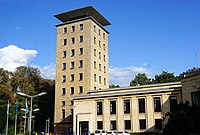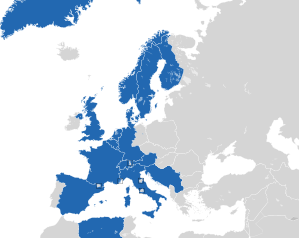Eurovision Song Contest 1962
| Eurovision Song Contest 1962 | |
|---|---|
Compagnie Luxembourgeoise de Télédiffusion (CLT) | |
| Website | eurovision |
| Participants | |
| Number of entries | 16 |
| Debuting countries | None |
| Non-returning countries | None |
| |
| Vote | |
| Voting system | Ten-member juries awarded points to their three favourite songs. |
| Winning song | "Un premier amour" |
The Eurovision Song Contest 1962 was the 7th edition of the annual
Sixteen countries participated in the contest – the same that took part the year before.
The winner was
Location

The 1962 Eurovision Song Contest was hosted in
Participating countries
| Eurovision Song Contest 1962 – Participation summaries by country | |
|---|---|
|
All countries who participated in the Eurovision Song Contest 1961 also participated in this edition.[1]
| Country | Broadcaster | Artist | Song | Language | Songwriter(s) | Conductor |
|---|---|---|---|---|---|---|
| ORF | Eleonore Schwarz | "Nur in der Wiener Luft" | German | Bruno Uher | Bruno Uher | |
| RTB | Fud Leclerc | "Ton nom" | French |
|
Henri Segers | |
| DR | Ellen Winther | "Vuggevise" | Danish | Kai Mortensen | ||
| YLE | Marion Rung | "Tipi-tii" | Finnish |
|
George de Godzinsky | |
| RTF | Isabelle Aubret | "Un premier amour" | French |
|
Franck Pourcel | |
SWF[a]
|
Conny Froboess | "Zwei kleine Italiener" | German |
|
Rolf-Hans Müller | |
| RAI | Claudio Villa | "Addio, addio" | Italian | Cinico Angelini | ||
| CLT | Camillo Felgen | "Petit bonhomme" | French |
|
Jean Roderès | |
| TMC | François Deguelt | "Dis rien" | French |
|
Raymond Lefèvre | |
NTS
|
De Spelbrekers | "Katinka" | Dutch |
|
Dolf van der Linden | |
| NRK | Inger Jacobsen | "Kom sol, kom regn" | Norwegian |
|
Øivind Bergh | |
| TVE | Víctor Balaguer | "Llámame" | Spanish |
|
Jean Roderès | |
| SR | Inger Berggren | "Sol och vår" | Swedish |
|
Egon Kjerrman | |
| SRG SSR | Jean Philippe | "Le Retour" | French | Cédric Dumont | ||
| BBC | Ronnie Carroll | "Ring-A-Ding Girl" | English |
|
Wally Stott | |
| JRT | Lola Novaković | "Ne pali svetla u sumrak" (Не пали светла у сумрак) | Serbo-Croatian |
|
Jože Privšek |
Returning artists
| Artist | Country | Previous year(s) |
|---|---|---|
| Camillo Felgen | 1960 | |
| François Deguelt | 1960 | |
| Fud Leclerc | 1956, 1958, 1960 | |
| Jean Philippe | 1959 (for |
Contest overview
After France's entry had been performed, there was a short power failure rendering the screens dark. There also seemed to be an even shorter power failure during the Netherlands' entry, when viewers around Europe only saw darkness on their television screens when the Netherlands performed. The power failure seemed to affect the Netherlands' score during the voting. Nevertheless, the song turned out to be popular in Europe after the contest.[1]
| R/O | Country | Artist | Song | Points | Place |
|---|---|---|---|---|---|
| 1 | Marion Rung | "Tipi-tii" | 4 | 7 | |
| 2 | Fud Leclerc | "Ton nom" | 0 | 13 | |
| 3 | Victor Balaguer
|
"Llámame" | 0 | 13 | |
| 4 | Austria
|
Eleonore Schwarz | "Nur in der Wiener Luft" | 0 | 13 |
| 5 | Ellen Winther | "Vuggevise" | 2 | 10 | |
| 6 | Inger Berggren | "Sol och vår" | 4 | 7 | |
| 7 | Conny Froboess | "Zwei kleine Italiener" | 9 | 6 | |
| 8 | De Spelbrekers | "Katinka" | 0 | 13 | |
| 9 | Isabelle Aubret | "Un premier amour" | 26 | 1 | |
| 10 | Norway
|
Inger Jacobsen | "Kom sol, kom regn" | 2 | 10 |
| 11 | Switzerland
|
Jean Philippe | "Le Retour" | 2 | 10 |
| 12 | Lola Novaković | "Ne pali svetla u sumrak" | 10 | 4 | |
| 13 | Ronnie Carroll | "Ring-A-Ding Girl" | 10 | 4 | |
| 14 | Luxembourg
|
Camillo Felgen | "Petit bonhomme" | 11 | 3 |
| 15 | Italy
|
Claudio Villa | "Addio, addio" | 3 | 9 |
| 16 | Monaco
|
François Deguelt | "Dis rien" | 13 | 2 |
Spokespersons
Each country nominated a spokesperson who was responsible for announcing the votes for their respective country via telephone. Known spokespersons at the 1962 contest are listed below.
 Sweden – Tage Danielsson[8]
Sweden – Tage Danielsson[8] United Kingdom – Alex Macintosh[3]
United Kingdom – Alex Macintosh[3]
Detailed voting results
This year marked the second jury voting system change in the contest's history, moving away from a point per favourite song from 10-member juries to the allocation of 3, 2 and 1 points given to the top three favourite songs from each country's 10-member jurors' ratings.
| Finland | 4 | 3 | 1 | ||||||||||||||
|---|---|---|---|---|---|---|---|---|---|---|---|---|---|---|---|---|---|
| Belgium | 0 | ||||||||||||||||
| Spain | 0 | ||||||||||||||||
| Austria | 0 | ||||||||||||||||
| Denmark | 2 | 1 | 1 | ||||||||||||||
| Sweden | 4 | 1 | 3 | ||||||||||||||
| Germany | 9 | 2 | 2 | 2 | 1 | 2 | |||||||||||
| Netherlands | 0 | ||||||||||||||||
| France | 26 | 1 | 2 | 1 | 1 | 3 | 3 | 3 | 3 | 3 | 2 | 2 | 2 | ||||
| Norway | 2 | 2 | |||||||||||||||
| Switzerland | 2 | 2 | |||||||||||||||
| Yugoslavia | 10 | 3 | 3 | 2 | 1 | 1 | |||||||||||
| United Kingdom | 10 | 2 | 2 | 2 | 1 | 3 | |||||||||||
| Luxembourg | 11 | 3 | 1 | 1 | 3 | 3 | |||||||||||
| Italy | 3 | 2 | 1 | ||||||||||||||
| Monaco | 13 | 3 | 2 | 1 | 3 | 1 | 3 | ||||||||||
3 points
Below is a summary of all 3 points received:
| N. | Contestant | Nation(s) giving 3 points |
|---|---|---|
| 5 | Switzerland,
| |
| 3 | Luxembourg
|
Monaco
|
Monaco
|
Luxembourg,
| |
| 2 | Italy
| |
| 1 | ||
Broadcasts
Each participating broadcaster was required to relay the contest via its networks. Non-participating EBU member broadcasters were also able to relay the contest as "passive participants". Broadcasters were able to send commentators to provide coverage of the contest in their own native language and to relay information about the artists and songs to their television viewers.[11]
Known details on the broadcasts in each country, including the specific broadcasting stations and commentators are shown in the tables below.
Notes
References
- ^ EBU. Retrieved 12 June 2012.
- ^ "Participants of Luxembourg 1962". European Broadcasting Union. Archived from the original on 31 March 2023. Retrieved 15 June 2023.
- ^ ISBN 978-1-84583-065-6.
- ^ "1962 – 7th edition". diggiloo.net. Archived from the original on 3 January 2022. Retrieved 15 June 2023.
- ^ "Detailed overview: conductors in 1962". And the conductor is... Retrieved 15 June 2023.
- ^ "Alle deutschen ESC-Acts und ihre Titel". www.eurovision.de (in German). ARD. Archived from the original on 12 June 2023. Retrieved 12 June 2023.
- ^ "Final of Luxembourg 1962". European Broadcasting Union. Archived from the original on 30 March 2021. Retrieved 30 March 2021.
- ^ ISBN 91-89136-29-2.
- ^ "Luxembourg 1962". Eurovision. Archived from the original on 30 March 2021. Retrieved 30 March 2021.
- ^ "Eurovision Song Contest 1962 – Scoreboard". European Broadcasting Union. Archived from the original on 23 July 2015. Retrieved 14 June 2021.
- ^ "The Rules of the Contest". European Broadcasting Union. 31 October 2018. Archived from the original on 4 October 2022. Retrieved 13 December 2022.
- ^ "Austria – Luxembourg 1962". European Broadcasting Union. Archived from the original on 13 May 2018. Retrieved 19 December 2022.
- ^ Limburgs Dagblad (in Dutch). 17 March 1962. p. 9. Retrieved 14 December 2022 – via Delpher.
- ^ a b "Televisiekijkers voor U". De Gazet van Aalst (in Flemish). 17 March 1962. Retrieved 14 December 2022.
- ^ "Programoversigt – 18/03/1962" (in Danish). LARM.fm. Retrieved 14 December 2022.
- ^ "Søndag den 18. marts 1962". www.dr.dk (in Danish). DR. 18 March 1962. Retrieved 22 March 2024.
- ^ a b "Radio ja televisio". Helsingin Sanomat (in Finnish). 18 March 1962. p. 33. Retrieved 7 November 2022.
- ^ a b "Programme TV". Radio TV - Je vois tout (in French). Lausanne, Switzerland: Héliographia SA. 15 March 1962. pp. 32–34. Retrieved 14 December 2022.
- ^ a b "Programmes radiophoniques – dimanche 18 mars". Radio TV - Je vois tout (in French). Lausanne, Switzerland: Héliographia SA. 15 March 1962. pp. 40–42. Retrieved 14 December 2022.
- ^ "Remise du Grand Prix Eurovision 1962 à la France" (in French). Institut national de l'audiovisuel. Retrieved 15 December 2022.
- ^ a b "Radio und Fernsehen". Der Bund (in German). Bern, Switzerland. 18 May 1962. p. 31. Retrieved 14 December 2022 – via e-newspaperarchives.ch.
- ^ a b "I programmi TV e radio". La Stampa (in Italian). 18 March 1962. p. 10. Retrieved 14 December 2022.
- ^ "Eurovision Song Contest 1962" (in Italian). Eurofestival News. 11 September 2016. Archived from the original on 11 April 2021. Retrieved 19 December 2022.
- ^ "Radio-Télévision". Luxemburger Wort (in German and French). 17 March 1962. p. 21. Retrieved 14 December 2022.
- ^ "Monaco – Luxembourg 1962". European Broadcasting Union. Archived from the original on 13 May 2018. Retrieved 19 December 2022.
- ^ a b "Programmes radiophoniques – vendredi 23 mars". Radio TV - Je vois tout (in French). Lausanne, Switzerland: Héliographia SA. 15 March 1962. pp. 57–59. Retrieved 14 December 2022.
- ^ "Zestien zingende landen naar Songfestival". De Nieuwe Limburger (in Dutch). 17 March 1962. p. 9. Retrieved 14 December 2022 – via Delpher.
- ^ a b "Se og Hør idag". Oppland Arbeiderblad (in Norwegian). 17 March 1962. p. 10. Retrieved 14 December 2022 – via National Library of Norway.
- ^ a b "Radio y TV". La Vanguardia (in Spanish). 18 March 1962. p. 31. Retrieved 14 December 2022.
- ^ HerGar, Paula (28 March 2018). "Todos los comentaristas de la historia de España en Eurovisión (y una única mujer en solitario)" (in Spanish). Los 40. Archived from the original on 26 September 2021. Retrieved 14 December 2022.
- ^ "Radio – Televisione". Giornale del Popolo (in Italian). Lugano, Switzerland. 17 March 1962. p. 9. Retrieved 19 December 2022 – via Sistema bibliotecario ticinese.
- ^ "Eurovision Song Contest Grand Prix 1962". Radio Times. 17 March 1962. Retrieved 14 December 2022 – via BBC Genome Project.
- ^ "Televizija – Nedelja – 18. marca" (PDF). Panorama glasova (in Slovenian). 17 March 1962. pp. 6–7. Archived (PDF) from the original on 15 December 2022. Retrieved 15 December 2022.
- ^ "Televizija – Nedjelja, 18. ožujka". Slobodna Dalmacija (in Serbo-Croatian). Split, SR Croatia, Yugoslavia. 17 March 1962. p. 8. Retrieved 15 December 2022.

